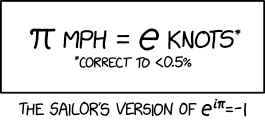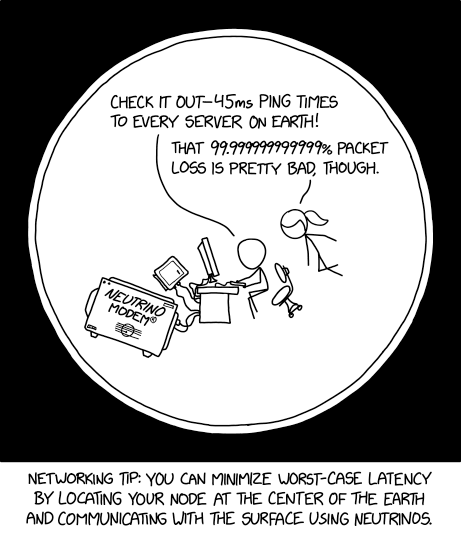nick = _@domain.tld in the twtxt.txt?
What should the advantage be to nick = _compared to just not defining a nick and let the client use the domain as the handle?
What is not intuitive is that you put something in the nick field that is not to be taken literary. The special meaning of _ is only clean if you read the documentation, compared to having something in nick that makes sense in the current context of the twtxt.txt.
Sun Avoidance
 ⌘ Read more
⌘ Read more
Have fun @johanbove@johanbove.info and see -(or read?)- you soon!
Thanks @bender@twtxt.net for the feedback. I fixed and expanded the article. I’m sorry for my poor interaction. Furthermore, I’m reading and writing while programming a client in Emacs.
D Roll
 ⌘ Read more
⌘ Read more
I’ve been making a little toy operating system for the 8086 in the last few days. Now that was a lot of fun!
I don’t plan on making that code public. This is purely a learning project for myself. I think going for real-mode 8086 + BIOS is a good idea as a first step. I am well aware that this isn’t going anywhere – but now I’ve gained some experience and learned a ton of stuff, so maybe 32 bit or even 64 bit mode might be doable in the future? We’ll see.
It provides a syscall interface, can launch processes, read/write files (in a very simple filesystem).
Here’s a video where I run it natively on my old Dell Inspiron 6400 laptop (and Warp 3 later in the video, because why not):
https://movq.de/v/893daaa548/los86-p133-warp3.mp4
(Sorry for the skewed video. It’s a glossy display and super hard to film this.)
It starts with the laptop’s boot menu and then boots into the kernel and launches a shell as PID 1. From there, I can launch other processes (anything I enter is a new process, except for the exit at the end) and they return the shell afterwards.
And a screenshot running in QEMU:

Exclusion Principle
 ⌘ Read more
⌘ Read more
Is AI finally ready to replace your doctor?
Advances in artificial intelligence mean that machines can now perform certain diagnostic tasks with far better accuracy than human doctors - but the picture is more complicated than you might think ⌘ Read more
China launches first batch of internet satellites + 2 more stories
China launches first 10 Guowang satellites for internet access; NASA’s Webb telescope challenges planet formation theories; NATO takes over coordination of Ukraine military aid. ⌘ Read more
after thinking and researching about it, yep, I agree that WebFinger is a good idea.
For example reading here: https://bsky.social/about/blog/4-28-2023-domain-handle-tutorial
I wasn’t considering some scenarios, like multiple accounts for a single domain (See ‘How can I set and manage multiple subdomain handles?’ in the link above)
Linear Sort
 ⌘ Read more
⌘ Read more
Europe launches a €10.6 billion Iris2 satellite project to rival Starlink
Europe launches €10.6 billion Iris2 satellite project; Paraguay reopens its embassy in Jerusalem, enhancing Israel’s diplomatic status. ⌘ Read more
Phase Change
 ⌘ Read more
⌘ Read more
METAR
 ⌘ Read more
⌘ Read more
The Maritime Approximation
 ⌘ Read more
⌘ Read more
China deploys historic naval fleet near Taiwan + 2 more stories
Global advertising revenue is projected to exceed $1 trillion; garment workers face increased heat risks; Taiwan raises alert over China’s largest naval fleet deployment. ⌘ Read more
GNU Shepherd 1.0 Service Manager Released As “Solid Tool” Alternative To systemd
GNU Shepherd as a service manager for both system and user services that is used by Guix and relying on Guile Scheme has finally reached version 1.0. For those not pleased with systemd, GNU Shepherd can be used as an init system and now has finally crossed the version 1.0 milestone after 21 years of development… ⌘ Read more
Making Tea
 ⌘ Read more
⌘ Read more
Did I write here already that the reason why I love Twtxt so much is that it works without having to compile, install anything extra. Just the bin applications that come with 95% of all operating systems and you’re good to read and participate, giving you have a domain name somewhere to host the twtxt.txt file.
I was thinking of ‘tw.txt’ to avoid a double T issue… Anyway I’d say the extension and MIME type are important to know what a file (could) contain
https://developer.mozilla.org/en-US/docs/Web/HTTP/MIME_types/Common_types
Reading the original spec, I understand why it should be a .txt file instead of, let’s say twtxt or anything else. In any case it could be nick.twtxt to support multiple users in the same directory.
What is curious to me was the decision at that moment of twtxt [dot] txt. You have the text part twice 🤔. Like mydb.db or eapl_todo.todo. Nothing really transcendental, just thinking out loud.
https://twtxt.readthedocs.io/en/latest/user/configuration.html
Upgrading my FreeBSD box to 14.2-RELEASE … I may have read something about some-Go-thing breaking but 🤞
World Bank launches record $100 billion aid + 1 more story
World Bank announces $100 billion support for struggling nations as Amnesty reports possible genocide in Gaza ⌘ Read more
Seismologists
 ⌘ Read more
⌘ Read more
You can select some text from a web page and right/command click and select print… and select To PDF to quickly save snippets for save-keeping or further reading.
Arctic could see first ice-free day by 2027 + 3 more stories
Macron and Saudi Crown Prince to co-chair a conference for Palestinian state; UN investigates Venezuela’s election fraud; new UN aid chief prioritizes funding; study predicts ice-free Arctic by 2027 ⌘ Read more
Infinite Armada Chess
 ⌘ Read more
⌘ Read more
# nick = skinshafi so... should I scream buuug ? 🤔
@prologic@twtxt.net Twtxt wise, it was kind of disparate at first xD with no access to logs as you may have read on the alt-feed itself. But then, @sorenpeter@darch.dk’s script came to the rescue … like, just in time 😁 Otherwise, everything else is fun as publicised, exploring and learning along the way.
Bluesky’s Open API Means Anyone Can Scrape Your Data for AI Training. It’s All Public
Bluesky says it will never train generative AI on its users’ data. But despite that, “one million public Bluesky posts — complete with identifying user information — were crawled and then uploaded to AI company Hugging Face,” reports Mashable (citing an article by 404 Media).
“Shortly after the article’s p … ⌘ Read more
@prologic@twtxt.net How so? I read the article but didn’t get who’s embracing and extending what to extinguish it…
Advent Calendar Advent Calendar
 ⌘ Read more
⌘ Read more
Bluesky Passes Threads for Active Website Users, But Confronts ‘Scammers and Impersonators’
Bluesky now has more active website users than Threads in the U.S., according to a graph from the Financial Times. And though Threads still leads in app usage, “Prior to November 5 Threads had five times more daily active users in the U.S. than Bluesky… Now, Threads is only 1.5 times larger tha … ⌘ Read more
did it work? I tried loading the file from /twtxt.txt, /twtAgent.php and /twtAgent2.php
Also reading the code, I see it creates two files, but I’m not sure which you are using now:
http://darch.dk/twtAgent.log <- 403 Forbidden
and
http://darch.dk/twtAgent.csv <- Not found here
Project update + 2 significant news stories
Trump threatens 100% tariffs on Brics nations over dollar currency rivalry; Severe flooding displaces over 122,000 in Malaysia ⌘ Read more
@xuu@txt.sour.is That’s cool, I read chapter one and will continue.
Landmark climate hearings set at UN court + 1 more story
More than 100 countries join ICJ for climate hearings; Germany plans a $25 billion hydrogen network; ⌘ Read more
Second Stage
 ⌘ Read more
⌘ Read more
Australia To Ban Under-16s From Social Media After Passing Landmark Law
Australia will ban children under 16 from using social media after its senate approved what will become a world-first law. From a report: Children will be blocked from using platforms including TikTok, Instagram, Snapchat and Facebook, a move the Australian government argue is necessary to protect their mental health and wellbeing.
… ⌘ Read more
Neutrino Modem
 ⌘ Read more
⌘ Read more
Cold Air
 ⌘ Read more
⌘ Read more
Nations pledge $300 billion for climate aid + 1 more story
Taiwan’s president plans South Pacific tour for stronger ties; UN talks result in $300 billion climate funding for developing nations. ⌘ Read more
D Combinatorics
 ⌘ Read more
⌘ Read more
Pacific aid falls due to Ukraine focus + 3 more stories
Aid to the Pacific falls 18% as focus shifts to Ukraine; Russia launches its first ICBM in the conflict; ICC issues arrest warrants for Netanyahu and Hamas leaders; Oropouche virus cases in Brazil surge amid new strain investigations. ⌘ Read more
Arizona Chess
 ⌘ Read more
⌘ Read more
China boosts support for Global South + 2 more stories
Chinese President Xi Jinping announces eight development measures for the Global South; President Biden visits the Amazon rainforest to boost climate efforts; Biden pledges record $4 billion to World Bank fund for poorest nations. ⌘ Read more
Kedging Cannon
 ⌘ Read more
⌘ Read more
Apple to launch new AI home screen + 2 more stories
Google expands AI flood forecasting to 700 million people; Apple plans to launch a new AI smart home hub; EU allocates €300 million for joint defense projects. ⌘ Read more
The Future of Orion
 ⌘ Read more
⌘ Read more
I think it’s centralized shit with lying about decentralization. All network is worked by two centralized things: plc.directory (did storage?) and network relay (bsky.network). You can host your relay but this require TOO MUCH resources (2TB storage and 32GB RAM read more ). Also i try running PDS and: 1. I can’t register account via app,only via cli 2. It leaked on 2GB virtual machine then killed by oom after trying to register account via cli
People prefer AI-generated poems to Shakespeare and Dickinson
Readers give higher ratings to AI-generated poetry than the works of poets such as William Shakespeare, Walt Whitman and Emily Dickinson – perhaps because they often have more straightforward themes and simpler structure ⌘ Read more
Europa Clipper
 ⌘ Read more
⌘ Read more